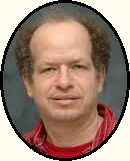Spadina Literary Review — edition 12 page 15
interview
The Oath Affair
interview with Dror Bar-Natan
Math professor Dror Bar-Natan late last year gained attention as the mauvais sujet who took the citizenship oath at a citizenship ceremony in Scarborough and immediately thereafter disavowed the “royalty part” — the part that requires the oath-taker to say “I will be faithful and bear true allegiance to Her Majesty Queen Elizabeth the Second Queen of Canada, Her Heirs and Successors”. (All those capital letters are in fact in the English-language version of the oath as posted on the official Citizenship and Immigration site.)

Bar-Natan
Bar-Natan was one of three new Canadians who had joined in a Charter challenge that targeted the royalty part of the oath as an offence against conscience, freedom of expression, and religious freedom (because people are compelled to swear allegiance to a monarch regardless of their personal beliefs), and against equality rights (because natural-born citizens do not have to take any such oath at all).
The legal action was defeated at the level of the Ontario Court of Appeal, the judgment being that new citizens must take the oath but are entitled to disavow any “message” they believe is contained in the oath.
For his efforts, Bar-Natan earned critics aplenty, who wanted to depict him as some kind of ingrate refusing to acknowledge the sheer genius of the Canadian constitution where the monarch and heirs and successors are merely benign symbols of Divine Right.
Here is our interview with Dror Bar-Natan. The reference to the “bible code” relates to his critique of the mathematical foundation for the decryption methods underlying Michael Drosnin’s apocalyptic bestsellers, the most recent iteration being The Bible Code III, which claim that extraterrestrial visitors planted hidden messages in the Hebrew Bible that predicted, for example, the A-bombing of Hiroshima, the 9/11 attack on New York, and so on.
Are you someone who generally participates in politics in a partisan way, or is it rather that specific issues (for example, The Bible Code) provoke you?
I’m not normally politically active. I was active thrice: the first time as a youth in 1982-1984, fighting against the 1982 Israeli invasion of Lebanon and in favour of a two-state solution for the Israeli-Palestinian conflict. (At the time this was novel; now it is almost universally agreed upon yet not within reach.) This period ended when I was drafted into the Israeli army like every other 18-year-old and I had to cease my political activity. After my three years of compulsory military service (as a math teacher) I moved to the U.S. for study, and my mind was elsewhere.
The second time I was active was indeed in relation to the so-called “bible codes” (though I’m not sure if this counts as “political”). Here what led me to become active was the feeling that mathematics, my academic discipline, was being misused, and the realization that I’m better positioned than almost anybody else to respond to that: I had math skills and programming skills and the relevant language skills, and that’s a rare combination.
My third “activity” is the oath affair. Here I never set out to be active and never desired it. All I wanted was to become a Canadian citizen without having to affirm loyalty to an institution I could not be loyal to. It was a personal matter, not a public one, and the publicity, from my perspective, is incidental.